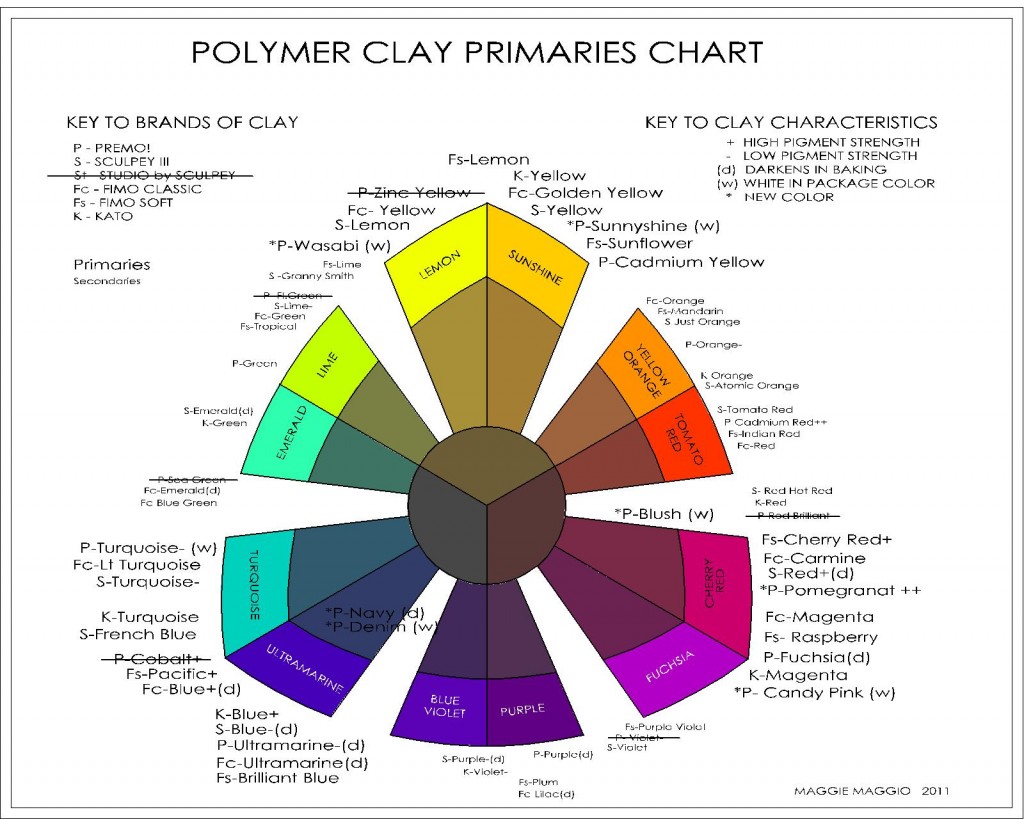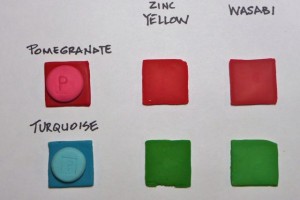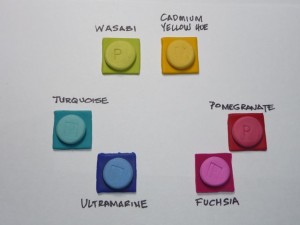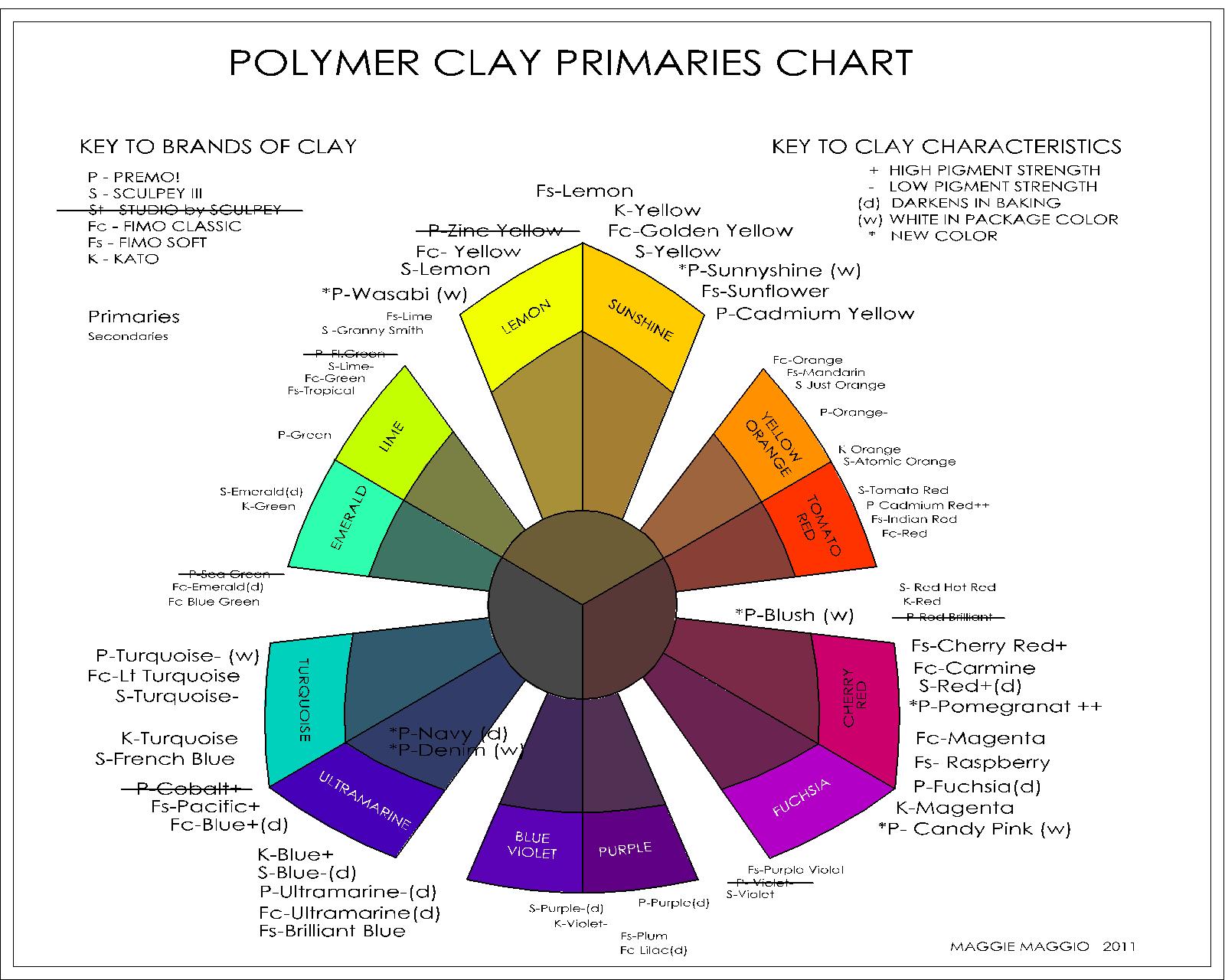 The polymer clays that are readily available in the big box craft stores have changed since our book was published in 2009. In the past year Polyform discontinued Studio by Sculpey and some key Premo colors while adding a few new Premo colors. This caused quite a controversy. Carol Simmons has done some detailed posts about this issue.
The polymer clays that are readily available in the big box craft stores have changed since our book was published in 2009. In the past year Polyform discontinued Studio by Sculpey and some key Premo colors while adding a few new Premo colors. This caused quite a controversy. Carol Simmons has done some detailed posts about this issue.
I’ve started testing the new Premo clays and added the possible primary colors to the chart above. I’ve also added a new category – package colors that have white – because I choose to use colors that are at full saturation and add white if I need it.
I like the new color Pomegranate. Its a bully, just as strong as Cad Red, but more of a Cherry Red than an Orange. It mixes well and doesn’t darken in baking – a welcome addition to the Premo line up.
 The most difficult colors to live without are the primaries Zinc Yellow and Cobalt Blue Hue. I prefer to use single primaries for demonstrating color mixing and without these two primaries I will need to go back to teaching a double primary system. With this in mind, I discovered that Wasabi can be used as a cool yellow in a pinch. Even though it has a little bit of both blue and white bias, it mixes colors close to when I am using Zinc Yellow.
The most difficult colors to live without are the primaries Zinc Yellow and Cobalt Blue Hue. I prefer to use single primaries for demonstrating color mixing and without these two primaries I will need to go back to teaching a double primary system. With this in mind, I discovered that Wasabi can be used as a cool yellow in a pinch. Even though it has a little bit of both blue and white bias, it mixes colors close to when I am using Zinc Yellow.
In the photo I compare the results of mixing Pomegrante and Turquoise with 1/2 of both Zinc and Wasabi yellows. The resulting colors are similar. Wasabi red is slightly darker due to the minuscule amount of blue in Wasabi, and the Wasabi green is slightly lighter due to the small amount of white that lightens up the Wasabi.
So as odd as it seems, Wasabi can be used as a choice for a yellow primary along with Cadmium Yellow. They are not as balanced as Zinc, but they do work. Unfortunately, there is nothing close to Cobalt Blue.
 Many folks using Premo have asked how to substitute for Zinc Yellow and Cobalt for the double primary exercises in Chapter Four of the book if they don’t want to order the clay from one of the three mail-order companies still carrying the discontinued colors.
Many folks using Premo have asked how to substitute for Zinc Yellow and Cobalt for the double primary exercises in Chapter Four of the book if they don’t want to order the clay from one of the three mail-order companies still carrying the discontinued colors.
My first suggestion is to use Wasabi and Cad Yellow, Turquoise and Ultramarine and Fuchsia and Pomegranate. You can also try the exercise using another brand of clay – selecting two yellows, two blues and two magentas from the primaries shown in the chart. I’m in the process of moving my studio from the basement to the second floor. Once I get settled, and can find things again, I will put up some photos of the Premo tests.


January 15, 2012 at 2:18 pm
I agree. The loss of Cobalt is tough. You could try the Kato blue. Hard to find but close to Premo cobalt.
January 11, 2012 at 3:59 am
I finally have time to play and this is what I have found:
I can live without zinc but cobalt blue is a real difficulty. I have always worked in CMY colour and tend toward blues in my palette. Ultramarine has some red bias and turquoise has a yellow bias so any way of mixing them gives a desaturated colour. Now the blues produced are nice, but unsuitable as a primary. This forces a split primary for cyan. My primaries used to be cobalt for cyan, 1:1 zinc to cad yellow for yellow, and 32:1 fuschia to cad red for magenta. Now?
Almost ready to go to fimo!
July 19, 2011 at 10:24 pm
Thanks Norma. Good luck at the shows.
July 19, 2011 at 9:00 pm
Thanks a lot for the tests. I’ll play with the new colors and the exercises in the book as soon as I get over some fairs.